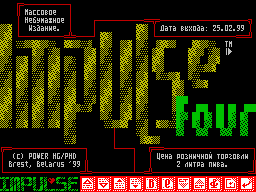|
Impulse #04
24 февраля 1999 |
|
Fractals - Fractals from a theoretical point of view.

FRACTALS from a theoretical perspective
(C) Adrien
Douady
Julia set and Mandelbrot set
Julia sets of quadratic maps and mnozhezhestvo Mandelbrot
appear in a situation that from a mathematical point of view is
extremely easy - from the sequences of complex numbers, defined
by induction using the relation: Z (n +1) = Z (n) ¤ + c, where
c - is a constant.
The behavior of the above sequence of numbers depends on the
parameter c and the starting point Z (0). If we fix c
and change the Z (0) in the field of complex numbers,
then we get the Julia set, and if we fix Z (0) = 0 and change
the parameter c, then we obtain the Mandelbrot set. If
take Z (0) far from zero, then the sequence will rapidly tend
to infinity. Of course, this is also true when the point Z (n)
for some n is far from zero. But there are such values Z (0),
for which the sequence (Z (n)) never goes away, but always
remains limited. When given c, these values form the filled
Julia set Kc for the polynomial Fc: Z-> Z ¤ + c. Present the
same Julia set consists of boundary points Kc.
It is only natural that the form of a set
Julia depends on the choice of c, but
surprised at how this relationship
strong. And, by changing c, you can get an incredible variety
of Julia sets: one of them look like large "thick" clouds
others resemble the sparse bushes of blackberries,
third look as the sparks flying in the sky
during the fireworks. There are two main types of Julia sets:
some of them are in one piece (we're talking connected), and
others represent the cloud of points (We call them the Cantor
set). For mathematics there is a good opportunity to introduce
a new set - a set values of c, for which the Kc is connected.
I call it the Mandelbrot set, as Benoit Mandelbrot was the
first recipient his image with a computer and initiated its
study.
Julia set is among the
the most interesting fractals. Most of them are self-similar.
Looking at the picture of any set of Kc in the microscope,
we'll see a picture that, firstly, depend little on whether, in
what place we look, and secondly does not significantly
olichaetsya from what we saw and without microscope. At the
same time, the Mandelbrot set M does not possess the
self-similarity: Yes, M is really an infinite number of copies
of itself and, therefore, in some place where we might look at
the boundary of M in the microscope, we can see some of the
small copies of M. But those copies woven into a network of
filaments, which form a very strongly depends on at what point
look. Moreover, if we consider
two copies of a comparable size, the ratio of the distance
between them to their size will depend greatly not only from
the point at which we observe, but also on the increase
microscope.
Invariant sets
Invariant with respect to any
Conversion is the figure of the complex plane are not affected
by this transformation. The simplest example is the figures
that are invariant under quadratic transformations f (x) = x ¤
+ b * x + c.
The method of constructing such sets will show the example
of the transformation:
f (x) = x ^ 4 +2 * Q * x ¤ + E (*)
First, choose any specific
values for Q and E, for example,
Q =. 13 + .4 i, E =. 08-.5i
The process of construction - an iterative, so we define the
Number of iterations: iteration = 5000
Initial value: X0 = 0
Iteration formula:
X (i +1) = eSQRT (-QeSQRT (Q ¤ + X (i)-E))
Equation (*) is generally the case 4
root. We must choose for each iteration of a single root. The
choice can be implement a random manner. e means plus or minus.
All calculations - over complex numbers. If the plot Xi: the
axis X - Re Xi, the axis Y - Im Xi for data values, the
resulting figure will resemble an island. The form of the
resulting shape depends on the values of Q and E.
Similarly we can construct a shape that is invariant under
any other transformation.
IMPERIO> The text was found and treated me to you
to the smallness of pomozgovat on this subject, here. From a
practical part of this question I really still do not
understand, but perhaps in the next issue of IMPULSE is a
serious discussion on this topic. I still urge all those who
may be something to bear on the topic of fractals to contact me
personally - would be very grateful.
Other articles:
Similar articles:
В этот день... 11 February